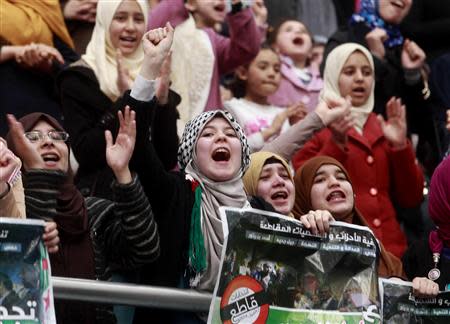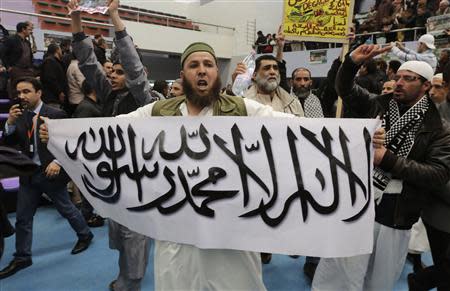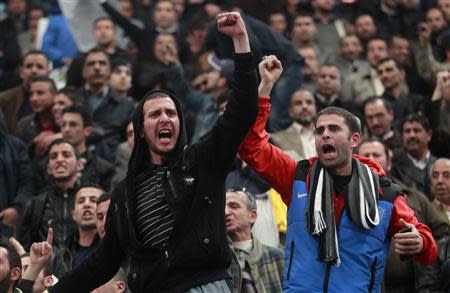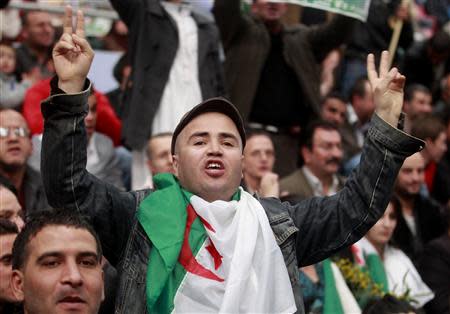Campaigning starts in Algeria election likely to re-elect Bouteflika
By Patrick Markey ALGIERS (Reuters) - Campaigning for Algeria's election opened on Sunday with the man expected to win, President Abdelaziz Bouteflika, starting his race not with a speech or a mass rally, but with a letter. With questions lingering about the state of his health after a stroke last year, Bouteflika, 77, began his campaign writing to Algerians to say his condition would not stop him extending his 15 years governing the North African state. Backed by the Front de Liberation Nationale party, which has dominated Algerian politics since independence in 1962, and with major opposition parties boycotting the vote, Bouteflika is almost assured of another 5-year term. Loyalists see the independence veteran as a guarantor of stability, crediting him with piloting Algeria out of chaos after a 1990s civil war with Islamists in which 200,000 people were killed. Bouteflika's opponents say the dominance of a clan of FLN veterans make the election an unfair battle, and they ask how the president will govern if he cannot even campaign. Since the stroke that put him in Paris hospital for several months, Bouteflika has rarely appeared. He has spoken in public only to announce his candidacy, at the start of March. El Watan newspaper, often critical of Bouteflika's re-election bid, ran a cartoon on its front page on Sunday with a man peering into a hollow, empty campaign poster with Bouteflika's name, asking: "Is there anyone in there?" Opposition parties, including the secular RCD and the Islamist MSP parties, are boycotting the April 17 ballot. But they remain weak and their protest is unlikely to dent Bouteflika's chances. In downtown Algiers on Sunday, there were barely any electoral posters along the bustling boulevards lined with white buildings dating back to French colonial rule. "It will be Bouteflika for me," said Abdel Waheed, 29, a salesman in downtown Algiers. "He is the one who brought this country forward, he is the one who gave us reconciliation." In his letter on Saturday night, Bouteflika promised constitutional reforms to create an inclusive political system if he is re-elected. But with little chance of change at the top, many Algerians appeared apathetic about the election. "ALWAYS THE SAME" "Doesn't really matter does it? Nothing changes anyway," said Linda, a 20-year-old student, when asked whether she would vote. "It is always the same. In Algeria there isn't any solution." Abdelhadi Dahmani, an office manager, said: "I don't think I will be voting. Because even if I vote what will it change? We won't see any change here soon." He added: "But let's see what happens. The most important, whoever wins, is stability." Bouteflika's camp says his re-election will preserve Algeria's stability in a region where the turmoil from the "Arab Spring" revolts of 2011 still buffets Tunisia, Libya and Egypt, where long-ruling leaders were ousted. Neighboring Libya, especially, is struggling after the fall of Muammar Gaddafi with the existence of brigades of former fighters. In addition, Islamist militants have used the turmoil to gain a foothold in Libya's remote southern deserts. Former prime minister Abdelmalek Sellal, who resigned to run Bouteflika's campaign, started canvassing in Algeria's south where many are still concerned about Islamist militants. "Be confident because we have a strong army and strong security, do not be concerned about instability in the region," Sellal told hundreds of government supporters in Tamanrasset, 2,000 km (1,200 miles) south of Algiers. "Bouteflika managed security and stability for Algeria." Stability in Algeria is also key for Western governments who see it as an ally in their battle against Islamist militancy in North Africa. Algeria is a key energy supplier to Europe. Still, Bouteflika's scarce appearances have left many asking what would happen if his condition deteriorates and he is forced to step down during his next five year term. Most analysts expect any potential transition to be smoothly managed by the FLN's political leadership and military generals. With $200 billion in foreign reserves, analysts say, Algeria has the financial cushion for now to spend heavily on housing and other services to ward off any social protests. (Additional reporting by Lamine Chikhi in Tamanrasset; Editing by Robin Pomeroy)




